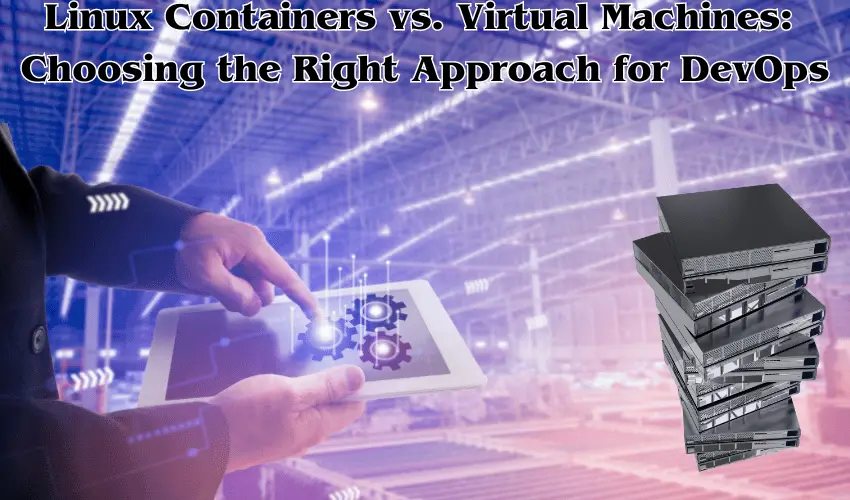So, you're on board, ready to accelerate software delivery, improve scalability, and make your applications as reliable as the sun rising from the east. But there's a critical decision you need to make: Should you go with Linux containers vs virtual machines (VMs) to power your DevOps dreams? Let's take a critical look into this tech showdown and help you choose the right tech for your DevOps process.
Also check: LinuxTechLab HomePage
Containers vs. VMs
Imagine moving into a new house, and you need some furniture. When it comes to DevOps, your software is the furniture, and the platform you choose to run it on is your new house. Containers and VMs are like two different types of houses, each with its own set of advantages and quirks.
Virtual Machines
Virtual machines are the big mansions of the DevOps neighborhood. Each VM is a complete house with its own walls, roof, and utilities. They're like self-contained worlds. Just like how you wouldn't have to share your bathroom with your neighbor in a mansion, VMs don't share resources like memory or CPU with each other.
VMs are fantastic for running different operating systems on the same physical server. Need to run Linux, Windows, and maybe even macOS on the same hardware? VMs are your go-to choice. They're great for when you need isolation, like when you're testing out some new software you cooked up.
But if you’re still new in the world of operating systems, it might be better to leave this container vs. VM dilemma to a nearshore software development firm. That’s because, while VMs sound all rosy, they are a bit like moving into a mansion when all you needed was a studio apartment. They can be resource hogs, and you end up running multiple copies of the same operating system, which can eat up precious memory and CPU cycles. An experienced software developer can help you get it right the first time so you don’t waste resources.
Containers
Containers are like those cool condo complexes in the heart of the city. They're efficient, compact, and perfect for city living—or, in our case, DevOps.
Containers share the same OS kernel with the host system, which means they're incredibly lightweight. You're not running multiple full-blown operating systems like with VMs; instead, you're sharing one OS kernel and packing your application and its dependencies into a tidy container. This efficiency means you can fit way more containers onto the same hardware than you could VMs. It's like having a skyscraper instead of a sprawling suburb.
Containers are all about consistency and reproducibility. You create a container image, define what goes in it, and ship it off to any environment. It'll run the same way on your laptop, in the cloud, or on a server in your basement.
The DevOps Dilemma: Which One to Choose?
Okay, so now that you know what containers and VMs are all about, let's get back to your DevOps conundrum. Which one should you choose? Well, it depends on your needs and what you're trying to build. Again, in very delicate situations, you may want to get help from a seasoned software development company. But here’s a general guideline.
When to Go with VMs:
- If you’re dealing with older applications that have complex dependencies or need different operating systems, VMs might be your best bet.
- When you need ironclad isolation between applications or teams—for example, if you're handling sensitive data—VMs provide a stronger barrier.
- If your applications are resource-hungry and need dedicated access to CPU and memory, VMs can offer better predictability.
When to Embrace Containers:
- Containers were practically made for microservices. If you're breaking down your applications into small, independent pieces, containers offer the perfect packaging.
- Containers can spin up and down in milliseconds, making them ideal for scaling your applications based on demand. VMs can't match this speed.
- If you want your software to behave the same way in every environment, containers are your best friends. They're like nomads, carrying their homes with them wherever they go.
- Containers are like a Marie Kondo makeover for your infrastructure. They're incredibly space-efficient and can run more containers on the same hardware.
Containers on VMs
Hold on, there's a twist! You don't always have to pick just one. You can have your containers and VMs together. Many seasoned developers use VMs as the host environment for containers.
This hybrid approach lets you enjoy the benefits of both worlds. You get the efficiency and scalability of containers, all while enjoying the isolation and versatility of VMs.
Final Thoughts
The best approach? Experiment and see what fits. DevOps is all about continuous improvement and adaptation. Try both containers and VMs for different parts of your infrastructure. Mix and match to find the perfect blend for your specific use cases.
We are giving you exclusive deals to try Linux Servers for free with 100$ credit, check these links to claim your 100$,
DigitalOcean - 100$ free credit & Linode - 100$ free credit
Check some Exclusive Deals, HERE.
Also, check out DevOps Book You should read section.
